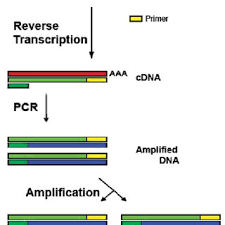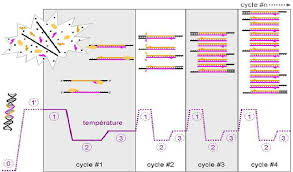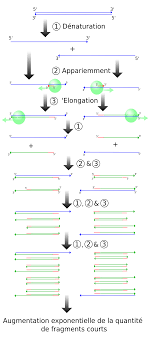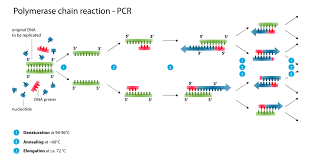Mastering PCR: Essential Protocols and Techniques
Crossover PCR: A Method for Gene Fusion
Crossover PCR is a technique used to create hybrid genes or introduce mutations by fusing two different DNA fragments. This protocol enables precise gene modifications, making it a powerful tool for studying gene function and protein interactions in various biological systems.
Cleaning of PCR Products: Ensuring Pure Amplifications
Cleaning PCR products is a crucial step to remove unwanted components such as primers, nucleotides, and enzymes. This protocol outlines methods to purify PCR products, ensuring high-quality DNA for downstream applications like cloning, sequencing, and mutation analysis.
PCR Product Cloning: A Gateway to Gene Analysis
Cloning PCR products is essential for further analysis of amplified DNA. This protocol covers the steps needed to clone PCR fragments into plasmids, enabling researchers to express, sequence, or modify genes for functional studies in various organisms.

Hot-Start PCR: Improving Amplification Specificity
Hot-start PCR is a modified version of traditional PCR that prevents non-specific amplification by activating the DNA polymerase only at high temperatures. This protocol enhances the specificity and yield of PCR reactions, particularly when working with complex templates or low-abundance targets.
Preventing Primer-Dimer Formation: Optimizing PCR Reactions
Primer-dimers are common artifacts that can compromise PCR results. This protocol offers strategies to minimize primer-dimer formation, such as optimizing primer design and reaction conditions, ensuring clean and efficient amplifications.
PCR Resource Online: A Digital Guide for PCR Success
PCR Resource Online provides a comprehensive collection of protocols, tips, and troubleshooting guides for PCR techniques. This resource is invaluable for both beginners and experienced researchers looking to optimize their PCR experiments.
Detailed Troubleshooting Tips for PCR
PCR can present numerous challenges, from weak amplifications to non-specific bands. This detailed troubleshooting guide helps researchers identify and resolve common PCR issues, improving the reliability and success of their experiments.
PCR-Based Molecular Cloning: Combining Amplification and Cloning
PCR-based molecular cloning combines the amplification power of PCR with cloning techniques to manipulate genes for various applications. This protocol provides detailed steps for amplifying and inserting genes into vectors, enabling studies in gene function and protein expression.

Handbook for DNA Isolation, RAPD-PCR, and PCR-RFLP
This handbook offers protocols for DNA isolation, Random Amplified Polymorphic DNA (RAPD-PCR), and Restriction Fragment Length Polymorphism (PCR-RFLP). These techniques are widely used in genetic fingerprinting, phylogenetic studies, and species identification.
Introduction to PCR: Understanding the Basics
This introductory guide provides a comprehensive overview of PCR, explaining the principles, components, and applications of the technique. It’s ideal for researchers new to PCR or those looking to refresh their understanding of this foundational molecular biology tool.
General PCR Introduction: The Foundation of Molecular Biology
This general introduction covers the core principles of PCR, from DNA denaturation to primer annealing and extension. It provides the foundational knowledge needed to understand more advanced PCR methods and applications.
PCR Animations: Visualizing the Process
PCR animations offer a dynamic way to understand the PCR process. This resource provides visual representations of each step in PCR, making it easier for researchers and students to grasp the mechanics and importance of this technique in genetic research.
PCR, RT-PCR, and Real-Time PCR Tutorials: Expanding PCR Applications
This comprehensive set of tutorials covers traditional PCR, reverse transcription PCR (RT-PCR), and real-time PCR. These guides provide step-by-step instructions and insights into the different applications of PCR in gene expression analysis, diagnostics, and quantitative research.
PCR Application Manual: Practical Uses of PCR
The PCR Application Manual offers detailed protocols for applying PCR in various fields, from molecular biology to diagnostics. This manual covers a wide range of applications, including cloning, sequencing, mutation detection, and pathogen identification.

PCR ELISA: Combining Amplification with Detection
PCR ELISA is a hybrid technique that combines PCR amplification with enzyme-linked immunosorbent assay (ELISA) detection. This protocol is used for detecting and quantifying specific DNA or RNA sequences, offering a highly sensitive and specific method for molecular diagnostics.
PCR RFLP: Genetic Fingerprinting and Polymorphism Detection
PCR-RFLP (Restriction Fragment Length Polymorphism) is a powerful technique for detecting genetic variation. This protocol outlines the process of amplifying a DNA fragment using PCR, followed by digestion with restriction enzymes to analyze polymorphisms in the genetic sequence.
PCR SSCP: Analyzing DNA Mutations
Single-Strand Conformation Polymorphism (SSCP) is a method for detecting mutations in DNA. This protocol provides the steps for performing PCR-SSCP, allowing researchers to identify genetic variations and mutations without sequencing.

Real-Time PCR: Quantifying DNA in Real Time
Real-time PCR, also known as quantitative PCR (qPCR), is used to monitor DNA amplification in real time. This protocol explains how to set up and run qPCR experiments, making it possible to quantify DNA or RNA levels in samples, which is essential for gene expression analysis and diagnostics.
RT-PCR Protocols: Amplifying RNA Targets
Reverse transcription PCR (RT-PCR) is used to convert RNA into DNA before amplification. This protocol is essential for studying gene expression and detecting RNA viruses, making it a fundamental technique in both research and clinical diagnostics.
Variants of PCR: Expanding the Toolbox
There are many variants of PCR designed to address specific challenges in DNA amplification. This protocol highlights different PCR techniques, such as multiplex PCR, nested PCR, and quantitative PCR, providing researchers with versatile methods for different experimental needs.